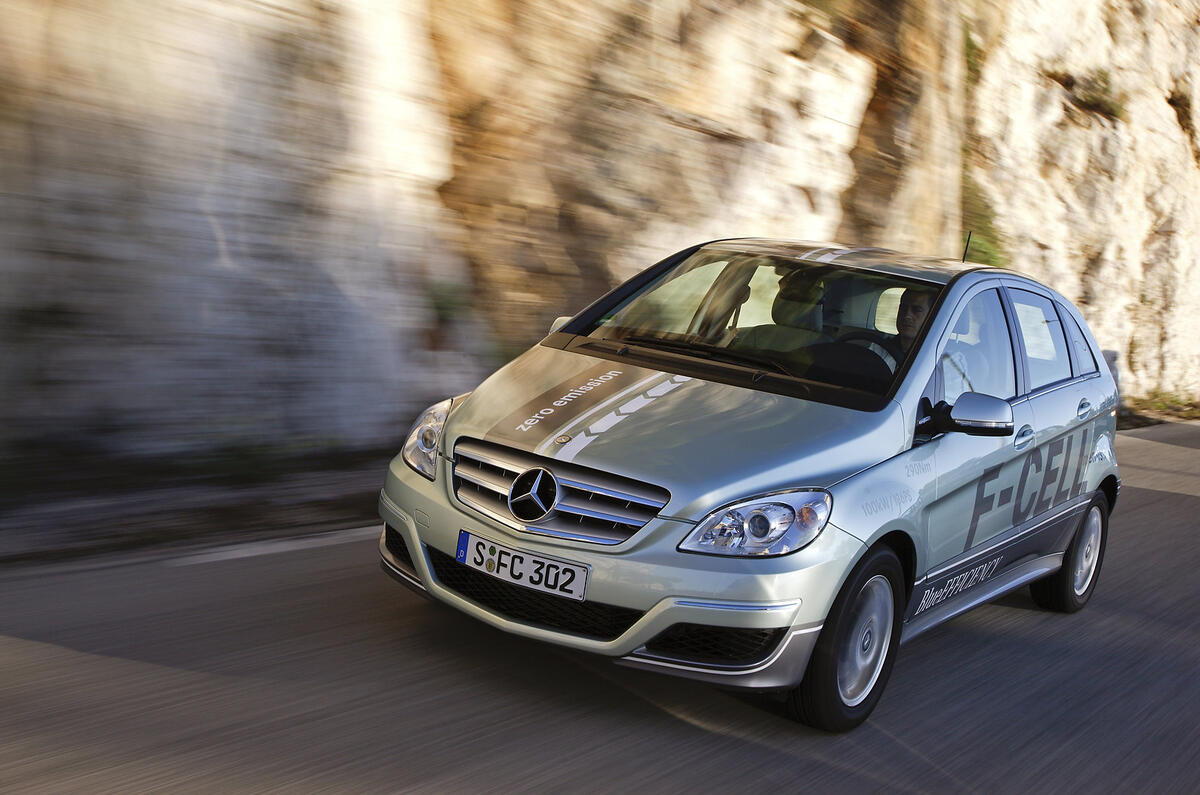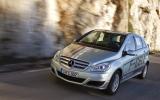What is it?
The way some of us will be driving in 2020 - possibly. With 100 fuel cell prototypes and 2.8 million miles of testing, Mercedes is now putting the nearly finalised fuel cell drivetrain into 200 B-Classes, with the intention of completing a few more years of real-world testing with real-world drivers.
This Mercedes-Benz B-Class F-Cell is as close to a production car as any fuel-cell-powered prototype in existence. That’s because the company has the huge advantage of the A/B-Class ‘sandwich’ platform, which was first launched in 1998.
Read our review on the Mercedes-Benz B-Class small MPV
Between the two floors there is a considerable void, which swallows three cylindrical hydrogen tanks, the fuel cell stack and a small lithium ion battery. The electric motor that drives the front wheels is mounted in the car’s nose.
Since the first A-Class-based prototype appeared in 1999, Mercedes has managed to massively shrink down the size of the fuel cell, as well as improving power output by 30 per cent and reducing hydrogen consumption by another 30 per cent.
The fuel cell stack can now also operate at 25deg C below freezing and it will start up instantly at -15deg. Cold-weather operation proved a developmental hurdle.
The hydrogen is pumped into the car’s three carbonfibre-wound tanks at 700bar and each tank holds just under 4kg of fuel. Mercedes claims a range of 250 miles at a cost today of £32. The ability to mount these tanks under the floor of the B-Class is a boon for crash safety.
While the fuel cell generates a charge to drive the electric motor, there’s also a 35kWh lithium ion battery mounted under the boot floor. This is used to both store energy from brake regeneration and for ‘cold starts’ while the fuel cell is coming up to its operating temperature. The battery can also be used to power the car on short journeys and when manoeuvring at low speeds.
What's it like?
It’s nearly impossible to tell that the car is anything other than a stock model. The interior is unchanged, there’s no loss of boot space and the only exterior clue is the special refuelling interface hidden behind the filler flap.
In terms of ride and handling, the B-Class F-Cell feels remarkably like its conventional sister cars. That is, a little dated. It suffers from a pretty stiff-legged ride, crashing over poor surfaces rather too often and delivering quite a lot of noise to the cabin while doing it.
However, the electric motor offers pretty brisk progress and, on good roads, the lack of underfloor mechanical action is very noticeable by its absence.
The combination of torque and a single transmission ratio means acceleration is utterly seamless. At higher speeds the car delivers a rather odd sensation, a kind of very low-friction progress, which might be best described as ‘whizzing’. The brakes, however, need to be stronger and more progressive.
Should I buy one?
There’s no doubt that fuel-cell motoring is impressive. The performance is uniquely delivered and the environmental impact minimal.
But there are two huge hurdles in the way of fuel-cell cars before we all rush out and buy one: the cost of the technology and the lack of a hydrogen refuelling infrastructure. But while Germany looks like it will install a serious network between its big cities by the end of the new decade, British drivers are unlikely to be so lucky.



















Join the debate
Add your comment
Re: Mercedes B-Class F-CELL
its not just the disposal of old batteries but in their manufacturing as well, i'm no expert but dont they use some pretty exclusive metals and materials which travel from all over the world involving some pretty un environmentally friendly processes to extract these materials and i doubt actually making the battery is a clean affair, so i agree fuel cell cars seem the better bet environmentally speaking though maybe not cost wise.
Re: Mercedes B-Class F-CELL
I think (and it's only a thought) part of the appeal of electric powered cars is the comparative ease with which a charging network could be set up. All you need to do then is run a few electricity cables to potential charging stations and you're network is in place.
Over time I would expect our electricity network to be upgraded to use more renewable energies, but the cost of this can be spread out over many years.
Hydrogen on the other hand requires everything from production plants, through distribution networks to refilling points.
Given that the UK economy, and many others, is not in the best of shapes, money will play a bigger role than ever.
So given a charging network for electric cars is cheaper and can be delivered faster, I can see the appeal it would hold for cash strapped goverments.
That's not to say it's neccesarily the best solution environmentally - something many green campaigners seem to forget. I don't know which option is best from that point of view, but like you, disposal of old batteries gives me cause for concern.
As for the B Class, I like the technology, just not the bloated lump that sits on top of the chassis.
Re: Mercedes B-Class F-CELL
It seems absolute madness to invest in any form of battery-reliant, plug-in network. Not only is it the most inefficient and wasteful way of powering electric cars, but the batteries cause devastating problems in disposal, recycling and cost of replacement. Far from being in any way good for the environment, it would be an ecological disaster when brought into the mainstream.
It is as if there is a form of institutional sham being perpetuated by industry, that relies on the media ignoring, or lacking a comprehensive vision of, the only methodology that makes practical sense: that is to roll-out hydrogen fuel cell vehicles as the popular format and create the necessary supply network. We could then produce the expensive hydrogen using the renewable energy from solar cells (which are extremely low maintenance) blanketing the deserts and other hot areas of the world.
I think it is only the self interests of an oil-centric economy and battery producers that would seek to avert the promotion of this idea, and while we are complacently and dubiously ignoring its potential, China and others are utilising this rich resource in places such as Africa and South America.
I'd be very interested in other people's views (perhaps better informed) on whether or not my perception of this issue makes sense.